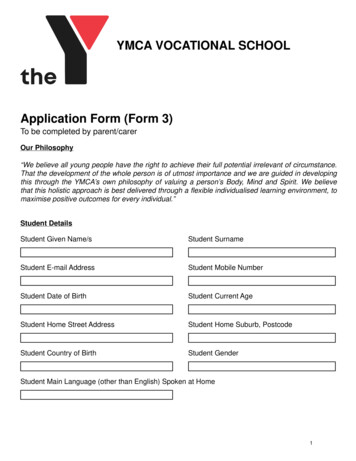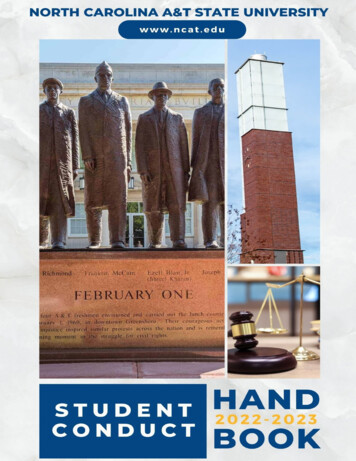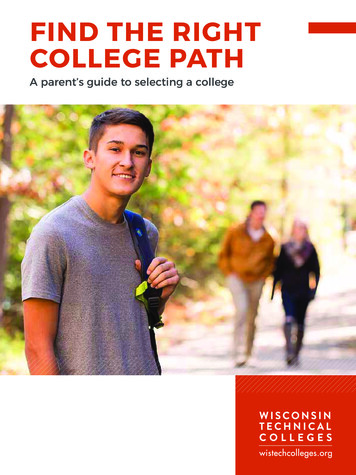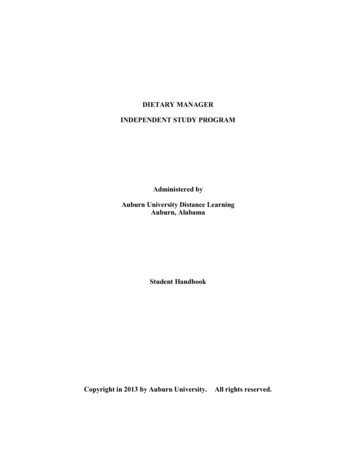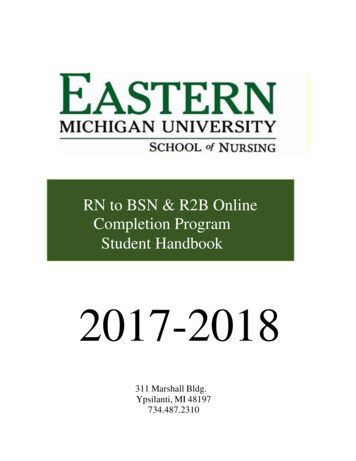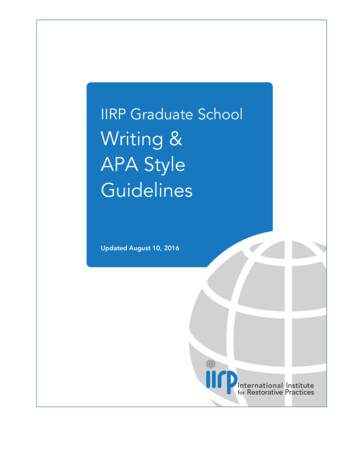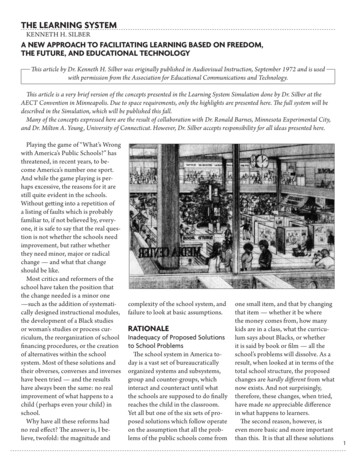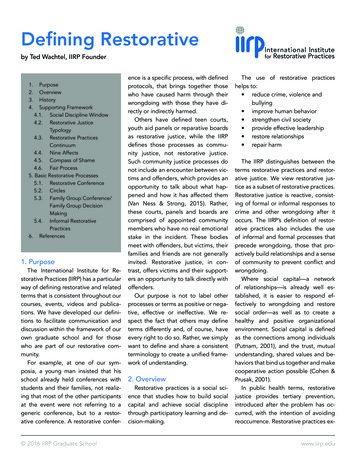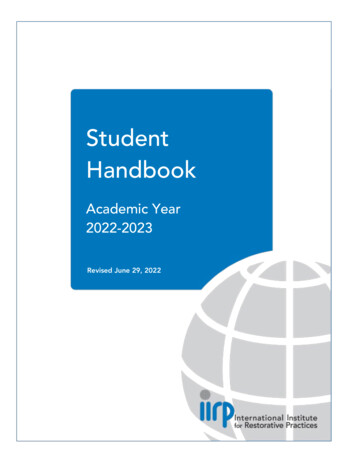
Transcription
StudentHandbookAcademic Year2022-2023Revised June 29, 2022
Student Handbook 2022-2023Revised 6/29/2022ContentsAbout Us . 4Mission . 4Vision. 4Educational Philosophy . 5Institutional Goals . 5History . 6Accreditation . 6Faculty, Staff, and Administration . 7Rights and Responsibilities of Students . 9Reciprocal Roles and Responsibilities . 9Student Feedback . 11Institutional Statements . 11Americans with Disabilities Act .11Equal Opportunity Statement.12Nondiscrimination Statement .12Policies . 13Code of Conduct .13Community Responsibility .15Data Privacy Policy .16Grievance Policy .18Personal Gift Acceptance Policy .22No-Money-Solicitation Policy .22Photography and Video Recording Policy .22Safety, Security, and Health . 23AIDS and HIV.23Drug-Free Schools and Communities and Drug-Free Workplace .25Emergency Notification .26Emergency Phone Numbers .27Facility Access .27Harassment, Sexual Harassment, and Stalking .28Health and Emergency .33Mental Health and Human Services Resources .33Safety Precautions .34International Institute for Restorative Practices2
Student Handbook 2022-2023Revised 6/29/2022Security in the Building .34Sex Offender Registry and Access to Related Information.34Sexual Misconduct.35Smoking Policy .43Student Right-to-Know and Campus Security Act .43Services and Facilities . 43Campus Location.43Food.44Library .44Lodging .44Lost and Found .44Parking .45Phone Number .45Student Support Services .45Technology . 46Acceptable Use .47Unacceptable Use .47Internet Peer-to-Peer File-Sharing Policy .48Textbook Cost Containment . 49Class Cancellation . 49This publication is certified as true and correct in content and policy as of the date of publication.The IIRP however reserves the right to make changes of any nature in programs, calendar, or academicschedules whenever these are deemed necessary or desirable including changes in policies andprocedures, course content, class rescheduling, and the cancelling of scheduled classes or otheracademic activities.International Institute for Restorative Practices3
Student Handbook 2022-2023Revised 6/29/2022About UsThe International Institute for Restorative Practices (IIRP) Graduate School is the world’s firstgraduate school wholly devoted to restorative practices. Our faculty – all scholar/practitioners –are dedicated to helping individuals find new ways to empower people and transformcommunities. This field, as well as our institution, is developing across national borders andprofessional disciplines in order to positively influence human behavior and improve civilsociety.Our campus in Bethlehem, PA, is the international and intellectual hub of our accreditedGraduate School.MissionThe mission of the International Institute for Restorative Practices Graduate School is tostrengthen relationships, support communities, influence social change, and broaden thefield of restorative practices by partnering with practitioners, students, and scholars.VisionPioneering the Science of Relationships and CommunityJust as our name suggests, the International Institute for Restorative Practices (IIRP) GraduateSchool was established to examine, teach, and develop restorative practices – an evolvingsocial science that looks to effect real change within communities by strengtheningrelationships and fostering a mutual regard among individuals. In practicing what we teach,we engage with our students to share practices that focus on improving relationships,responsibility, and respect.We also empower our students to train others, to take this thinking outside of their classes andshare it with their families, friends, schools, workplaces, and communities. In every course,students engage in useful projects, draw on the experience of faculty, and form supportivenetworks of peers. Our graduates emerge as seasoned changemakers, who bring their ownunderstanding of restorative practices with them wherever they go, and lead others by theirexample.As the science of restorative practices grows and evolves, we are dedicated to always being onthe forefront: pioneering new concepts, new approaches, and new methods.International Institute for Restorative Practices4
Student Handbook 2022-2023Revised 6/29/2022Educational PhilosophyThe IIRP Graduate School offers graduate degree and professional development programmingthat will promote learning, personal growth, and social responsibility among its students byintegrating the core concepts of restorative practices in all teaching and learning activities.We believe that every human being has intrinsic value, deserves to be treated with respect,is capable of changing and growing, and is inherently motivated to learn. We also believe thatlearning occurs best within a participatory learning community with students actively engagedin their own learning and interacting with their fellow students, and that learning should notonly build capacity for the future but should address current problems and challenges facingindividuals and society.Graduates will be thoughtful practitioners, able to advance in their profession, and committedto developing their own capacities through habits of exploration and reflection. They will beeffective communicators and will have a well-developed capacity to engage in lifelong inquiryand learning. They will have an understanding of healthy interpersonal and organizationalrelationships and will work well with others in responding to new and unexpected challengesthat arise in their organizations and communities.Lastly, the IIRP Graduate School’s aim, as suggested by Albert Einstein in a speech in 1936,“is the training of independently acting and thinking individuals who, however, see in theservice of the community their highest life problem.”Institutional GoalsWe will educate a growing number of professionals who are capable of applying restorativepractices to strengthening civil society.We and our graduates will contribute to the growth of knowledge through our research and itsapplications.We will disseminate the results of our theory and practice to professionals in related disciplineswith the goal of positively influencing human behavior.International Institute for Restorative Practices5
Student Handbook 2022-2023Revised 6/29/2022HistoryThe face of higher education is changing rapidly and dramatically around the world. The IIRPhas designed its offerings and services to meet the needs of 21st century adult learners andprofessionals. All that the IIRP offers is mission-driven, rooted in everyday professional practiceand accessible from anywhere in the world through a wide range of flexible learning options.We are dedicated to the study of restoring relationships, social discipline, emotional well-being,and civic participation through participatory learning and decision making.Our faculty and graduate students engage in reflection, scientific inquiry, and academicdiscussion, drawing on theory as well as their own professional practice and personalexperience. Our entire institution is guided by the premise that “people are happier, morecooperative, more productive, and more likely to make positive changes when those inauthority do things with them, rather than to them or for them.”With roots in restorative justice, a way of looking at criminal justice that emphasizes repairingthe harm done to people and relationships, restorative practices has the broader goal ofproactively developing community, managing conflict, building relationships, and increasingsocial capital.The establishment of the IIRP Graduate School was the culmination of decades of work inrestorative practices by a number of pioneers around the world, among them the IIRP’sfounders, Ted and Susan Wachtel, who developed many of the theories at Buxmont Academyand the Community Service Foundation.AccreditationThe IIRP is accredited by the Middle States Commission on Higher Education, 1007 NorthOrange Street, 4th Floor, MB #166, Wilmington, DE 19801 (267-284-5011). The Middle StatesCommission on Higher Education is an institutional accrediting agency recognized by the U.S.Secretary of Education and the Council for Higher Education Accreditation.International Institute for Restorative Practices6
Student Handbook 2022-2023Revised 6/29/2022Faculty, Staff, and AdministrationMain Office Phone Number: 610-807-9221Gina B. Abrams, Associate Professor, Director of Research and Program Evaluation(267-576-0366)University of Delaware, B.S., Physical Education Studies, 1995Boston University, M.S.W., Social Work Macro Practice, 1999Boston University, M.P.H., Social and Behavioral Health, 2000Rutgers University, Ed.M., Statistics, Measurement, and Evaluation, 2012Boston University, Dr.P.H., Leadership, Management, and Policy, 2017Craig Adamson, Provost, Associate Professor (215-416-3723)Temple University, B.A., Criminal Justice, 1995International Institute for Restorative Practices, M.R.P.Y.C., 2008Lesley University, Ph.D., Educational Studies with Specialization in Adult Learning, 2012Borbála Felligi, Assistant Professor (610-807-9221)Eötvös Loránd University, M.A., Social Policy, 2002University of Cambridge, Trinity Hall, M.Phil., Criminology, 2004Eötvös Loránd University, Ph.D., Social Policy, 2008Mary Jo Hebling, Dean of Continuing Education Lecturer (215-778-2956)Temple University, B.A., Communications and Theater, 1979International Institute for Restorative Practices, M.S.,Restorative Practices and Youth Counseling, 2012Jamie Kaintz, Dean of Student Services (610-807-9221)Cedar Crest College, B.A., Applied Psychology, 2016International Institute for Restorative Practices, M.S., Restorative Practices, 2021Linda Kligman, President (610-807-9221)Drexel University, B.S., Civil Engineering/Applied Technologies, 1991International Institute for Restorative Practices, M.S., Restorative Practices, 2015Union Institute and University, Ph.D., Interdisciplinary Studies, 2020Patrick McDonough, Ph.D., Vice President for Academic Affairs EmeritusInternational Institute for Restorative Practices7
Student Handbook 2022-2023Revised 6/29/2022Zeau Modig, Librarian (610-807-3007)Stockton State College, B.A., Historical Studies, 1981Rutgers University, Information and Library Studies, M.L.S., 1985Fernanda Fonseca Rosenblatt, Assistant Professor (610-807-9221)Universidade Católica de Pernambuco, B.A., Law, 2003Katholieke Universiteit Leuven, M.A., Criminology, 2005University of Oxford, Ph.D., Criminology, 2014Frida Rundell, Professor (610-694-9936)Johannesburg College of Education Transvaal, Teachers’ Diploma, 1967University of South Africa, Diploma in Special Education, 1981Graduate School of Marketing, Diploma in Marketing Management, 1983University of Witwatersrand, Certificate in Instrumental Enrichment, 1988South African Institute of Marital & Family Therapy, Family Therapy, 1990University of South Africa, B.A., 1991University of South Africa, B.A. (Hons.), Psychology, 1993University of Natal, M.Ed., Psychology, 1996University of Zululand, Ph.D., Community Psychology, 2000Thomas Simek, Ed.D., Professor EmeritusElizabeth Smull, Lecturer (267-718-7608)Millersville University, B.S., Secondary Education, 2000International Institute for Restorative Practices, M.R.P.Y.C., 2008Theodore Wachtel, FounderInternational Institute for Restorative Practices8
Student Handbook 2022-2023Revised 6/29/2022Rights and Responsibilities of StudentsThe role of students in the educational community of the IIRP involves a balance of rights andresponsibilities. The freedom to learn depends upon appropriate opportunities and conditionsin the classroom, on the campus, and in the larger community. Students are required toexercise their freedoms with appropriate responsibility. The responsibility to create generalconditions conducive to the freedom to learn must be shared by all members of the IIRPcommunity. (See Reciprocal Roles and Responsibilities, below.)Reciprocal Roles and ResponsibilitiesWe engage in our collective work as a new Graduate School mindful of our special missionto advance restorative practices in all that we do. In that we did not arise from a pre-existingcollege with established traditions, we place the following expectations in front of us, asstudents, faculty, staff, and board members interact with one another:Students Should Expect to participate in an organization employing IIRP's Basic Concepts and using Fair Processfor decision making; to be supported in the process of teaching and learning by staff and Board; to receive fair and individual attention from faculty; to receive from faculty the opportunity to acquire a quality education that meets thegoals of their programs; to receive useful advising and guidance from faculty and staff; to follow faculty expectations and participate actively; to give and receive honest feedback with all others.International Institute for Restorative Practices9
Student Handbook 2022-2023Revised 6/29/2022Faculty Should Expect to participate in an organization employing IIRP's Basic Concepts and using Fair Processfor decision making; to be ever mindful of its responsibilities for financial, educational, and mission integrity; to be supported in the process of teaching and learning by staff and Board; to offer students fair and individual attention in classes and in advising; to offer students the opportunity to acquire a quality education that meets the goalsof the students’ programs; to model restorative practices in their classrooms; to receive genuine effort, cooperation, and participation from students; to cooperate with staff and Board as needed to manage the organization effectivelyand efficiently; to both give and receive trust and support with the staff and Board; to give and receive honest feedback with all others.Staff Should Expect to participate in an organization employing IIRP's Basic Concepts and using Fair Processfor decision making; to be ever mindful of its responsibilities for financial, educational, and mission integrity; to support the process of teaching and learning among students and faculty; to give and receive honest feedback with all others; to offer students accessibility, support, quality advising, guidance, etc.; to provide for the faculty’s needs for instructional support, technology, etc.; to receive from the faculty timely and accurate data, cooperation, policy adherence, etc.; to both give and receive trust and support with faculty and Board; to support the Board’s functions with timely information, staff access, communicationsand updates, policy recommendations, etc.International Institute for Restorative Practices10
Student Handbook 2022-2023Revised 6/29/2022The Board Should Expect to oversee an organization employing IIRP's Basic Concepts and using Fair Processfor decision making; to nurture an organization in which all constituents remain faithful to the mission; to oversee a governance structure marked by openness, transparency, trust, respect,and safety; to give and receive honest feedback with all others; to hold the President responsible for the administration of the institution and to focusits own activity on policy and program issues; to offer trust but also to demand accountability from all constituencies; to be ever mindful of its oversight responsibilities for financial, educational, and missionintegrity; to receive the information it needs from faculty and staff in a timely and accurate mannerwhen making institutional decisions.Student FeedbackThe IIRP views feedback as healthy and as an opportunity for positive change. Students areencouraged to express both positive and critical feedback to faculty, administrators, and staff.The IIRP encourages students to voice their opinions and feelings because they play a criticalrole in the ongoing improvement of the Graduate School. The IIRP often asks students toidentify themselves when completing course evaluations or student surveys. Part of ourrestorative culture is that identifying yourself allows us to create opportunities for dialogueto clear up any misunderstandings and get clarification if necessary.Institutional StatementsAmericans with Disabilities ActThe IIRP adheres to the principles and mandates of the Americans with Disabilities Act of 1990and the Rehabilitation Act of 1973 and the ADA Amendments Act of 2008.A disability is defined as a physical or mental impairment that substantially limits one or moreof the individual’s major life activities, even if the student uses a mitigating measure such asInternational Institute for Restorative Practices11
Student Handbook 2022-2023Revised 6/29/2022glasses, medication, prostheses, or a hearing aid. Major life activities are functions such asbreathing, caring for oneself, performing manual tasks, walking, seeing, hearing, speaking,learning, exercising cognitive abilities, sitting, standing, lifting, reaching, and working. The IIRPwill voluntarily provide reasonable accommodations, upon request, to a student whosecondition meets the legal definition of a disability under the ADA and who is consideredotherwise qualified for IIRP admission.Special classroom set-ups, alternate testing, and other accommodations for students withdocumented disabilities are available on a case-by-case basis. The IIRP is not required by lawto change the “fundamental nature or essential curricular components of its programs in orderto accommodate the needs of disabled students.” It is the responsibility of students withdisabilities to identify themselves and request accommodations through the office of the VicePresident for Administration well in advance of need in order to give the IIRP a reasonableamount of time to evaluate the request and, if possible, implement the accommodation.Equal Opportunity StatementThe International Institute for Restorative Practices (IIRP) Graduate School admits students ofany race, color, religion, national or ethnic origin, age, gender, gender identity or expression,sex, sexual orientation, familial, marital, or veteran status, HIV status, or disability to all therights, privileges, programs, and activities generally accorded or made available to students.The IIRP Graduate School admits students equally with regard to these categories.Nondiscrimination StatementThe International Institute for Restorative Practices (IIRP) does not discriminate against anyperson based on actual or perceived race, color, gender, gender identity or expression, sexualorientation, religion, ancestry, genetic information, national origin, familial status, maritalstatus, age, veteran status, HIV status, mental or physical disability – or any other basis – inadministration of its educational policies, employment policies, scholarship, or loan programsor other education related programs administered by the Institute.Consistent with its name and mission, ideally concerns would first be addressed informally,through informal discussions or a restorative circle. If a solution is reached it should be put inwriting, signed and dated by both parties, and copied to the Vice President for Administration.However, persons choosing not to participate in a restorative process should report theincident in writing to the Vice President for Administration.International Institute for Restorative Practices12
Student Handbook 2022-2023Revised 6/29/2022PoliciesCode of ConductThe IIRP recognizes the basic rights and responsibilities of the members of the Institute andaccepts its obligation to preserve and protect those rights and responsibilities. Further, theInstitute must provide for its members the opportunities and protections that best serve thenature of the educational process.The Code of Conduct governing the behavior of members of the IIRP must ensure the basicrights of individuals, as well as reflect the practical necessities of the community. The Code alsomust prohibit or limit acts that interfere with the basic purposes, necessities, or processes ofthe IIRP or with the rights of its members. Finally, the Code must reconcile the principles ofmaximum freedom and necessary order.SanctionsConsistent with the philosophy of restorative practices, the emphasis of the IIRP disciplinaryprocesses is on repairing the harm and restoring the well-being of the educational community.Although sanctions may be appropriate or necessary, violators of the IIRP Code of Conduct willbe afforded the opportunity to participate in a restorative process.Sanctions for violations of the IIRP Code of Conduct may include penalties ranging fromwarning (written or verbal) to expulsion from the graduate program but will be tailored toaddress the circumstances of each offense and ideally decided in conjunction with the offenderas part of the process. Ultimately, the administration of the IIRP will be responsible for suchsanctions.The Code of Conduct shall be made public in an appropriate manner and may be revised bythe IIRP in consultation with the faculty, students, and staff.Behaviors Inconsistent with IIRP ValuesThe Code of Conduct describes behaviors that are inconsistent with the essential values of theIIRP community. Those directly violating the Code of Conduct and those who assist, condone,or who are aware of the violations and do not report them are engaging in behaviors thatcontradict the values of the IIRP. Such behaviors include but are not limited to:International Institute for Restorative Practices13
Student Handbook 2022-2023Revised 6/29/20221. Physically harming or threatening to harm any person, intentionally or recklessly causingharm to any person, or reasonable apprehension of such harm or creating a conditionthat endangers the health and safety of self or others.2. Sexually assaulting or abusing a person. The Institute does not tolerate sexual assault orabuse, such as rape (including acquaintance rape) or other forms of nonconsensualsexual activity.3. Harassing, stalking, or hazing any person, including sexually harassing.4. Using, possessing, or storing weapons or fireworks.5. Tampering with fire or other safety equipment or setting unauthorized fires.6. Illegally possessing, using, distributing, manufacturing, selling, or being under theinfluence of alcohol or other drugs.7. Intentionally providing false or inaccurate reports of emergencies or Code violations orknowingly providing false statements during a hearing, disciplinary conference, or toIIRP officials.8. Stealing, vandalizing, damaging, destroying, or defacing Institute property or propertyof others.9. Obstruction or disruption of classes, research project, or other activities or programsof the graduate school; or obstructing access to IIRP facilities, property, or programs.Disruption is defined as an action or combination of actions by one or more individualsthat unreasonably interferes with, hinders, obstructs, or prevents the operation of theIIRP or infringes on the rights of others to freely participate in its programs and services.10. Violating the Academic Integrity Policy.11. Failing to comply with reasonable directives to provide identification or to report to anadministrative office or, when reasonable cause exists, failing to leave Institute-controlledpremises when directed to do so by properly authorized persons, including police and/orInstitute staff.12. Making, using, or possessing any falsified IIRP document or record; altering or forgingany Institute document or record, including identification or access cards. Includes butnot limited to: forging (signing another’s name and/or ID number) or manufacturing IDs,altering permits, and misuse of forms (letterhead stationery, IIRP forms).13. Unauthorized entry into or use of IIRP property or facilities, including classrooms,offices, and other restricted facilities. The IIRP also has the right to control use and entryInternational Institute for Restorative Practices14
Student Handbook 2022-2023Revised 6/29/2022into facilities for reasons of security, safety, or protection of property. This includesclosing facilities at specified times. It should also be recognized that an open orunlocked door is not an invitation to enter and use facilities.14. Engaging in disorderly, disruptive, lewd, or indecent conduct. Inciting or participating ina riot or group disruption. Failing to leave the scene of a riot or group disruption wheninstructed by officials. Disorderly conduct may include disruption of programs,classroom activities, or functions and processes of the IIRP. This item
2 days ago

